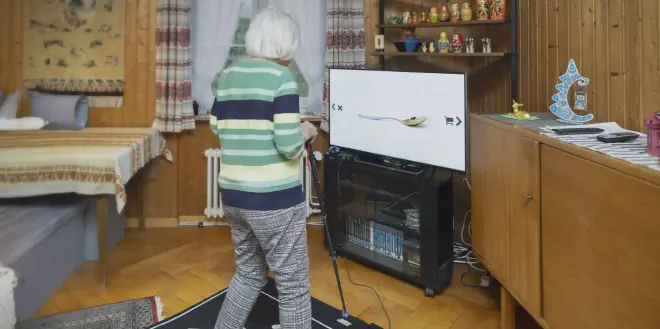

Now, the first drugs have emerged that can slightly slow down disease progression in the early stages of Alzheimer’s – which is the most common of several different forms of dementia. However, these drugs are not yet authorised in Switzerland and are only relevant to a small group of patients. In recent years, “exergames” emerged as a low-risk alternative or complement treatment to medications. These fitness games combine physical activity with brain-exercises – without any undesired side effects. In 2021, a study involving researchers from ETH had already shown that this kind of training improves not only cognitive but also physical abilities, as well as the quality of life of people with severe dementia.
Now, two new ETH studies have shown that training with “exergames” also works in older individuals with mild cognitive impairment – an early stage of dementia. “Not only did game-based training improve the cognitive performance of study participants, but we also measured significant changes in their brains,” explained Patrick Manser, who is now carrying out research at the Karolinska Institute in Stockholm. Both studies emerged from his doctoral thesis at ETH Zurich and confirm the findings obtained in 2021.
Remember that #
-
Around 40 people with mild cognitive impairment and an average age of 73 trained for around 25 minutes, 5 times a week over a 12-week period.
-
In response to the training, an increase was found in the study participants’ cognitive performance and in the volume of brain regions responsible for memory.
-
The researchers showed that the changes in the brain were correlated with the improvements in memory and general cognitive performance.
Training for mind and body #
In the two studies, Manser and his colleagues examined around 40 people with mild cognitive impairment and an average age of 73. Study participants trained at home for around 25 minutes, 5 times a week over a 12-week period, using a system consisting of a screen with the game software and a floor panel with four fields that measured the person’s steps.
The participants generally had to solve predefined tasks on the screen by performing a sequence of movements with their feet. For example, they would attempt to memorise a shopping list and then decide by stepping to the right or left whether the product shown was on the list or not. “Tasks like these train specific cognitive abilities that deteriorate in dementia patients, such as attention, memory or visuospatial skills,” Manser said.
Memory improves significantly #
In their first study, the researchers showed that there were significant improvements in the cognitive performance and memory of those doing the training. These improvements were not only statistically significant but also noticeable in everyday life – while shopping, in conversations or when dealing with stress, for example. Study participants reported feeling fitter, more lucid and more self-assured. In contrast, study participants in the control group, who continued with their usual therapies, experienced a worsening of their condition – which matches the typical disease progression.
The results are encouraging above all for people showing initial signs of dementia and for their relatives: “We hope that, with targeted exergame training, we’ll be able to slow down and reduce dementia symptoms,” explained project leader and co-author Professor Eling D. de Bruin, who carries out research at ETH Zurich and Eastern Switzerland University of Applied Sciences OST.
Structural changes in the brain #
“These regions play an important role in neurodegenerative diseases. Reduced hippocampal volume is even considered an early feature of dementia,” explained de Bruin. The fact that the researchers were able to measure structural changes after just 12 weeks is, he says, impressive proof of the brain’s plasticity – even in people showing the first signs of dementia.
The researchers also showed that the changes in the hippocampus and thalamus were correlated with better cognitive performance and better memory. This is a first indication of a potential causal, disease-modifying effect of the training. “Our results give us confidence for the future. However, demonstrating whether the personalised, game-based training can delay or even prevent the development of dementia will require studies in which the participants train for longer than three months. There are already plans for projects of this kind,” concluded de Bruin.
Citation #
First study #
- The paper “Brain-IT”: Exergame training with biofeedback breathing in neurocognitive disorders was published in Alzheimer’s & Dementia. Authors: Patrick Manser, Eling D. de Bruin.
“Brain-IT”: Exergame training with biofeedback breathing in neurocognitive disorders
Patrick Manser, Eling D. de Bruin
First published: 29 May 2024 https://doi.org/10.1002/alz.13913Citations: 12
Funding #
Synapsis Foundation - Dementia Research Switzerland. Grant Number: 2019-PI06
Gebauer Stiftung
Fondation Dalle Molle
Acknowledgments #
The authors would like to thank all collaborating recruitment partners for establishing contact between individuals with mNCD/MCI and the study team and all participants in this study for their participation and valuable contribution to this project. Additionally, we would like to thank all master’s students in our study team who were involved in the data collection and supervision of the participants, namely Nadine Decher, Anna Riedler, Enis Ljatifi, Julia Müller, Julia Czopek-Rowinska, and Wanda Kaiser. This sponsor-investigator initiated study was funded by Synapsis Foundation - Dementia Research Switzerland (grant 2019-PI06) and “Gebauer Stiftung”, and financially supported by “Fondation Dalle Molle.” “Senso Flex” training systems were provided free of charge by Dividat AG for the duration of the study. Neither the funders nor Dividat AG played any role in the design of this study, nor did they play any role in the collection, management, analysis, and interpretation of data; writing of the report; or decision to submit the report for publication.
Second study #
- The paper Structural Brain Improvements Following Individually Tailored Serious Exergame-based Training in Mild Neurocognitive Disorders: Exploratory Randomized Controlled Trial, was published in Alzheimer’s Research & Therapy. Authors: Patrick Manser, Michael Rosio, André Schmidt, Lars Michels & Eling D. de Bruin 8 September 2025, doi: external page10.1186/s13195-025-01835-2
Acknowledgements #
The authors would like to thank all the collaborating recruitment partners for establishing contact between individuals with mNCD and the study team and all the participants in this study for their participation and valuable contribution to this project. We also thank Dr. Roger Christoph Lüchinger from the Institute for Biomedical Engineering at ETH Zurich and the University of Zurich for his support in setting up the MRI scanning protocol and in teaching the first author how to perform the scans independently. Additionally, we would like to thank all the Master students on our study team who were involved in the data collection and supervision of the participants, namely, Nadine Decher, Anna Riedler, Enis Ljatifi, Julia Müller, Julia Czopek-Rowinska, and Wanda Kaiser. Finally, we would like to thank Nabiel H. Efrem (MSc. in Statistic) from the Department of Neurobiology, Care Sciences, and Society at Karolinska Institutet for providing statistical consultancy and advice on statistical methods and reporting.
Funding #
Open access funding provided by Karolinska Institute. This sponsor-investigator-initiated study was funded by the Synapsis Foundation-Dementia Research Switzerland (grant 2019-PI06) and “Gebauer Stiftung” and financially supported by the “Fondation Dalle Molle”. The “Senso Flex” training systems were provided free of charge by Dividat AG for the duration of the study. Neither the funders nor Dividat AG played any role in the design of this study, nor did they play any role in the collection, management, analysis, and interpretation of data, writing of the report, or decision to submit the report for publication.
- The article Training to improve memory signed by Christoph Elhardt, Corporate Communications was published in ETHZ’s news section
Contact [Notaspampeanas](mailto: notaspampeanas@gmail.com)

